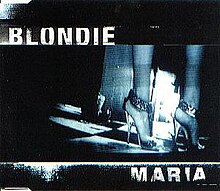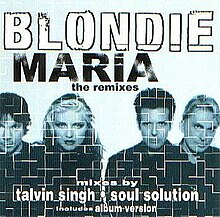
"Flying Without Wings" is a song by Irish boy band Westlife, released on 18 October 1999 as the third single from their self-titled debut studio album (1999). It is the band's fourth-best-selling single on both paid-for and combined sales in the United Kingdom as of January 2019.

No Exit is the seventh studio album by American rock band Blondie, released on February 15, 1999, by Beyond Music. It was the band's first album in 17 years and features the UK number-one single "Maria". As of March 2006, the album had sold two million copies worldwide.
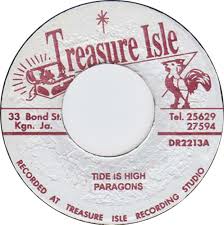
"The Tide Is High" is a 1967 rocksteady song written by John Holt, originally produced by Duke Reid and performed by the Jamaican group the Paragons, with Holt as lead singer. The song gained international attention in 1980, when a cover version by the American band Blondie became a US and UK number one hit. The song topped the UK Singles Chart again in 2002 with a version by the British girl group Atomic Kitten, while Canadian rapper Kardinal Offishall had a minor hit with his interpretation in 2008.

"U Remind Me" is a song by American singer Usher. It was written by Edmund "Eddie Hustle" Clement and Anita McCloud and produced by Clement along with duo Jimmy Jam & Terry Lewis for Usher's third studio album 8701 (2001). A mid-tempo R&B track, the song is about a man who meets a woman who seems like a nice catch, but he decides not to enter a relationship with her because she looks too much like an ex-girlfriend with whom he had a bad breakup.

"When the Lights Go Out" is the second single released from British group Five's debut studio album, Five (1998). It was released in early 1998. The song was co-written by the group alongside Eliot Kennedy, Tim Lever and Mike Percy, and John McLaughlin. It was co-produced by Kennedy, Lever and Percy, with the US version receiving additional production from Cutfather & Joe.

"Smooth" is a song performed by American rock band Santana and Rob Thomas of Matchbox Twenty, who sings the lead vocals. It was released on June 15, 1999, as the lead single from Santana's 1999 studio album, Supernatural. It was written by Itaal Shur and Thomas, who re-wrote Shur's original melody and lyrics, and produced by Matt Serletic.

"Maria Maria" is a song by American rock band Santana featuring the Product G&B, included on Santana's 18th studio album, Supernatural (1999). The song was written by Wyclef Jean, Jerry "Wonda" Duplessis, Carlos Santana, Karl Perazzo, and Raul Rekow, while Jean and Duplessis produced it. The track samples the drum beat from "God Make Me Funky" by American jazz fusion band the Headhunters, and the melody riff was inspired by the Wu-Tang Clan song "Wu-Tang Clan Ain't Nuthing ta Fuck Wit". Interspersed with guitars and other strings, "Maria Maria" is driven by a hip hop beat. At the 2000 Grammy Awards, the song won Best Pop Performance by a Duo or Group with Vocals before it experienced commercial success.

"U Know What's Up" is a song by American R&B singer Donell Jones. It was written by Edward "Eddie F." Ferrell, Darren Lighty, Clifton Lighty, Balewa Muhammad, Anthony Hamilton, and Veronica McKenzie for his second studio album, Where I Wanna Be (1999), while production was helmed by Ferrell and Darren Lighty for Untouchables Entertainment.

"Most Girls" is a song by American singer Pink, released as the second single from her debut album, Can't Take Me Home (2000). It was released on June 6, 2000, and, after spending 16 weeks on the US Billboard Hot 100 chart, peaked at number four on November 25. The song also reached number one in Australia, where it was certified platinum, number two in Canada and New Zealand, and number five in the United Kingdom.

"My Love Is Your Love" is a song by American singer Whitney Houston. It was written and produced by Wyclef Jean and Jerry Duplessis for Houston's fourth studio album of the same name (1998). Released on May 31, 1999, as the album's fourth single, it received positive reviews and was successful worldwide, hitting the top 10 in 23 international markets. The song peaked at number four on the US Billboard Hot 100, number two in the United Kingdom, and number one in New Zealand and Poland. It was later certified platinum by the Recording Industry Association of America (RIAA).
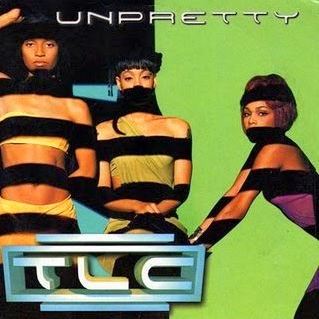
"Unpretty" is a song by American group TLC, released on May 17, 1999, through LaFace and Arista Records as the second single from the band's third studio album, FanMail. It was written by Tionne "T-Boz" Watkins and producer Dallas Austin. Watkins had written a poem to express her disgust over an episode of Ricki Lake, and Austin helped her adapt it into the song.

"Here with Me" is the debut single of English singer-songwriter Dido. It was the first single she released from her 1999 debut studio album, No Angel. The song was written about her then-boyfriend Bob Page. The single was released on 17 May 1999 in the United States but was not released in the United Kingdom until February 2001, serving as Dido's debut single in her home country. In other territories, it was issued as the album's second single, following "Thank You". Shortly after its release, "Here with Me" was used as the theme song for the American science fiction television programme Roswell (1999–2002).

"Swear It Again" is a song by Irish boy band Westlife. The ballad was released on 19 April 1999 in the United Kingdom as the first single from their debut album, Westlife (1999). The song peaked at number one on the UK Singles Chart for two weeks, giving Westlife their first of 14 UK number-one singles. "Swear It Again" is Westlife's only single to have charted in the US, peaking at number 20 on the Billboard Hot 100 and ranking number 75 on the Billboard Hot 100 year-end chart in 2000.

"If I Let You Go" is a song by Irish boy band Westlife. It was released in the United Kingdom on 9 August 1999 as the second single from their self-titled debut album (1999). It became the band's second number-one hit, spending 11 weeks on the UK Singles Chart. The song has received a gold sales certification in the UK for selling over 400,000 in combined sales of purchased and streaming-equivalent sales. It is the band's 10th-best-selling single in paid-for sales and combined sales in the UK as of January 2019.
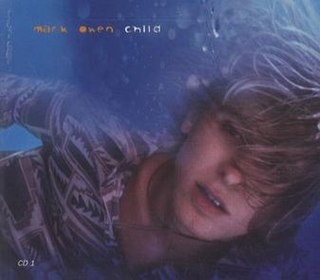
"Child" is the debut solo single of Take That band member Mark Owen, released on 18 November 1996. It was the first single to be released from Owen's debut album, Green Man (1996). He told in an interview, "It was the first song I wrote, and while I was writing the others I always knew it was going to be the first." "Child" peaked at number three on the UK Singles Chart, making it Owen's joint-most-successful single of his solo career. It was certified silver and sold over 200,000 copies. The song reached number one in Lithuania, Spain, and Taiwan and peaked within the top 10 in Austria, Belgium, Czech Republic, Denmark, Ireland, and Switzerland.

"We Come 1" is a song by British electronic band Faithless from their third studio album, Outrospective (2001). The song was issued as the album's lead single on 4 June 2001, two weeks before Outrospective was released. The remixes by Wookie and Dave Clarke that appear on the single releases are included on the bonus disc of the album Reperspective: The Remixes.
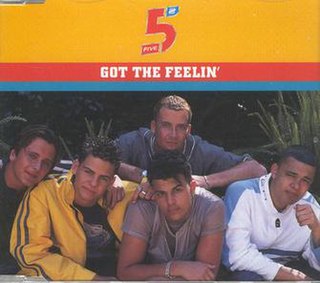
"Got the Feelin'" is a song by English boy band Five. It was released in June 1998 as the third single from their debut studio album, Five (1998). It was written by Richard Stannard, Julian Gallagher, Jason "J" Brown, Sean Conlon, and Abs Breen and produced by Denniz Pop and Jake Schulze. The song became a hit, peaking at No. 3 in the United Kingdom, No. 2 in New Zealand, No. 4 in Ireland, and No. 6 in Australia. It was also successful in several mainland European countries.
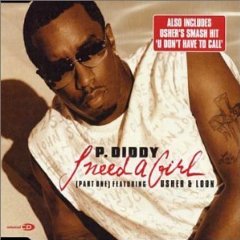
"I Need a Girl (Part One)" is a single by American rapper P. Diddy featuring Usher and Loon from the album We Invented the Remix. In 2004, the song was featured on the Bad Boys compilation R&B Hits. Along with "I Need a Girl (Part Two)", P. Diddy achieved a rare occurrence by having two parts of a song become chart hits. Part one peaked at number two on the US Billboard Hot 100 and number one on the Billboard Hot Rap Tracks chart. It also charted on the UK Singles Chart at number four. The song was ranked number 15 on the Billboard Hot 100 year-end chart in 2002. The song contains a chord progression played on a Roland JV-1080 sound module, using a patch named "Flying Waltz".

"Crying at the Discoteque" is a song by Swedish band Alcazar from their debut studio album, Casino (2000). The track samples Sheila and B. Devotion's 1979 hit "Spacer". Alexander Bard produced the song and can be heard in the middle of this song. Released in April 2000, "Crying at the Discoteque" became Alcazar's first international hit single the following year, reaching number one in Hungary and the top 10 in Flanders, Germany, Ireland, Italy, and Switzerland.

"Everything's Gonna Be Alright" is a song by German-based music group Sweetbox. It was released in October 1997 as the second single from their debut album, Sweetbox (1998), the only album that had American singer Tina Harris as the group's frontwoman. The song is based on "Air" from Johann Sebastian Bach's Orchestral Suite No. 3, played on the track by the German Symphony Orchestra. "Everything's Gonna Be Alright" is the most successful song of Sweetbox worldwide; it reached the top five in Austria, France, Iceland, Ireland, Norway, Spain, Sweden, and the United Kingdom. Outside Europe, the song peaked at number 46 on the US Billboard Hot 100.
